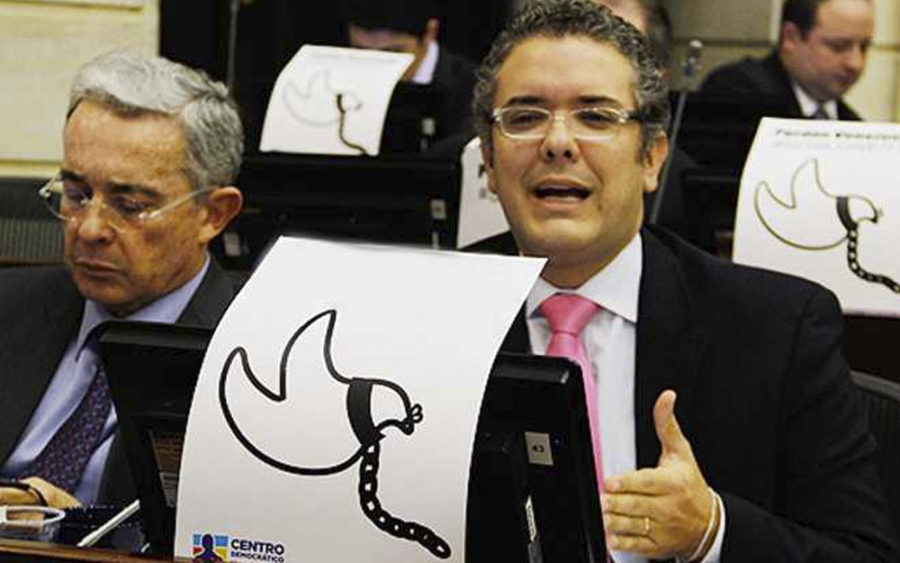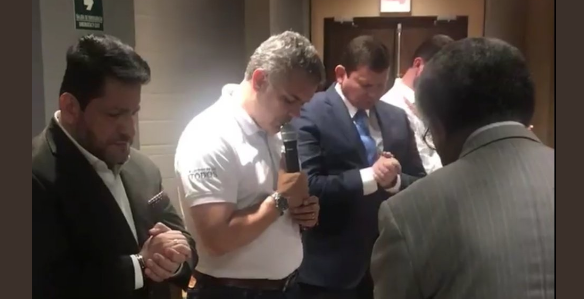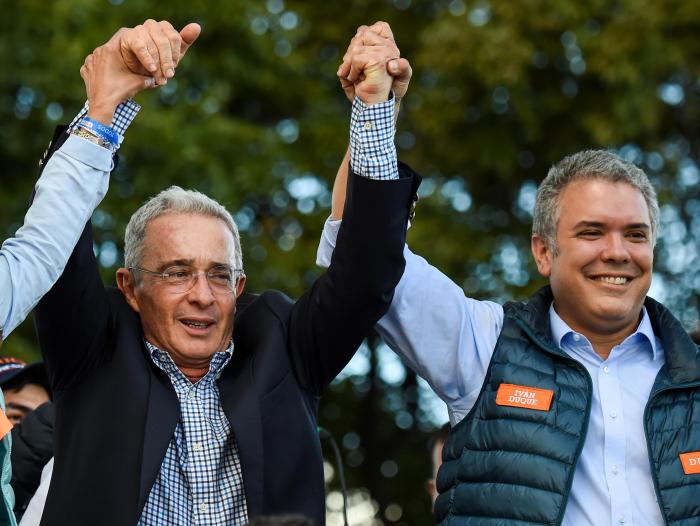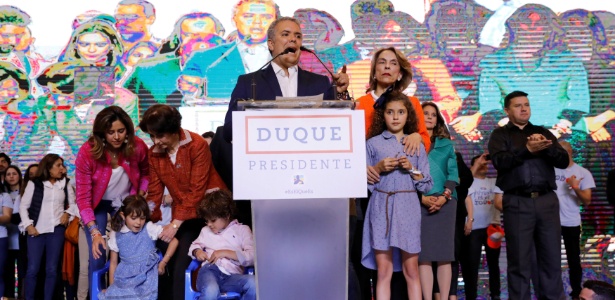By Franklin Gil Hernandes
Apparently, attacks on “gender ideology”, quite central to the 2016 peace referendum, were peripheral in the 2018 Colombian presidential campaign. But to better grasp what has happened we must distinguish across the different levels in which electoral discourses have circulated. At the public level of the presidential campaign, reflected in TV debates, press releases and street speech acts the main topics related to gender and sexuality were abortion and same-sex marriage rights, but even there these issues were not exactly at the center of the parlance. At that level, “Castro-chavismo” the rhetoric resource used to provoke fear was much more palpable: the gender devil was replaced by the specter of Venezuela. This rhetoric stigmatized the left and attributed a supposed ‘class hatred’, the evils of socialist social protection policies – described as assistencialists – and political to candidate Gustavo Petro and has decidedly prevailed. It does not seem excessive, however, to suggest that the 2016 anti-gender flares have paved the way for the 2018 demonization of the left.
On the other hand, the “gender ideology” rhetoric remained alive, albeit less visibly, at other levels. In debates with specific audiences such as the groups led by Christian pastors, the ultraconservative camp and social media circuits, such as Facebook and WhatsApp, the rhetoric of the “defense of families” has circulated widely. “Gender” was therefore placed elsewhere in the presidential elections discourse, eventually because the issue was somewhat politically worn out in 2016. This does not mean that Duque’s political party and his allies have abandoned the anti-gender and anti-rights agenda. Rather, this is now a concealed platform. It does not explicitly appear in the new government policy platform.
During the campaign, when questioned about abortion decriminalization, same-sex marriage and adoption, Duque openly declared his opposition, but he also expressed support to equal economic and inheritance in the case of same-sex couples. Having said that, it is disturbing to see candidates being questioned on these issues, given that abortion is decriminalized on three grounds and same-sex marriage and adoption are now fully enshrined in Colombian law. We may interrogate why these topics are raised in electoral debates if this is not a strategy to flag polemic issues that allow for the voters to identify or not with the candidate. In any case, what is important to remark is that the issues were not flagged by Duque himself. His political and policy agenda was clearly centered on the foolish idea of ‘Colombia becoming Venezuela’, the defense of private property and of private investors and the revision of the Peace Agreement.
Furthermore, it is necessary to have in mind that even when the conservative block contrary to the peace process constitutes a significant part of the voters who elected Duque, in order to win the election he had to also build alliances with center-right sectors that wanted to take distance from Petro’s agenda, viewed by them as “too radical”. It is my view that a strategy to moderate the discourse on gender was crafted to attract these center-right sectors. This is, in fact, the reason why Duque was chosen as the candidate: as a young representative from the moderate right whose profile contrasts with the old and entrenched conservative Alejandro Ordoñez, a figure that is repealed at the center of the political spectrum. Duque was a rather neutral and low-profile figure of Centro Democrático, which could have chosen as candidate other politicians with greater visibility.
 Against this backdrop, when asked what is going to happen with gender and sexuality under the Duque administration, my response is that it is already happening. The Centro Democrático block and its allies have already pushed for amending the procedures of the Special Jurisdiction for Peace (JEP in Spanish) that resulted from the 2016 agreement. [1] The amendments are significant and very problematic because they restrict JEP’s powers to request the extradition of persons involved in the armed conflict and to create a special procedure to prosecute the military accused of violations. These changes are in contradiction with the original content of the agreement. The second amendment, in particular, delays the indictment and judgment of the military and generates a juridical insecurity that may also compromise the accountability of public employees and politicians for war crimes and crimes against humanity. [2]
Against this backdrop, when asked what is going to happen with gender and sexuality under the Duque administration, my response is that it is already happening. The Centro Democrático block and its allies have already pushed for amending the procedures of the Special Jurisdiction for Peace (JEP in Spanish) that resulted from the 2016 agreement. [1] The amendments are significant and very problematic because they restrict JEP’s powers to request the extradition of persons involved in the armed conflict and to create a special procedure to prosecute the military accused of violations. These changes are in contradiction with the original content of the agreement. The second amendment, in particular, delays the indictment and judgment of the military and generates a juridical insecurity that may also compromise the accountability of public employees and politicians for war crimes and crimes against humanity. [2]
During the campaign, Duque promised to reform some aspects of the agreement and this already contradicted its basic clauses, because the Havana consensus is not supposed to be unilaterally disputed. Now, various human rights academics and institutions consider these reforms to be unconstitutional and say that they further undermine the peace process which is already undergoing an escalating crisis at the ground level. These changes are also interpreted as expressing the interests of powerful economic sectors known for having supported the paramilitary and who want to evade investigations and prosecution.
The other key revision was the dilution of language on gender perspective and LGBTI rights that originally read as follows:
“Gender approach. In order to ensure effective equality and to avoid exclusion in all its dispositions and proceedings that will be applied, JEP will adopt a gender approach, hereby understood as the acknowledgement and transformation of unequal power relations that subordinate women and the LGBTI population, fuel discrimination and gender inequality, and limit the effective realization of rights and of access to property and resources”
In its new version the definition now reads:
“Gender approach. In order to ensure real and effective equality to avoid discrimination and exclusion in all its dispositions and proceedings, JEP will apply its a gender approach. Even though unequal gender relations precede the armed conflict, in its dispositions and proceedings PSJ will take under account those conditions that were instrumentalized, theta aggravated and escalated during the conflict, deepening the harms, consequences, and impact of violence on people’s life. [3]
We do not know exactly the extent of the exclusion of the LGBT acronym from all articles of the proposed revision, as these revised norms can be interpreted to still encompass the LGBTI population under the general ‘gender approach’ [4]. However, the effort to make invisible and “correct” what is understood as an “excess” and an “imposition” of presently ruling politicians it is quite evident. This political style is in my view what will characterize the gender and sexuality politics of Duque administration from now on. These changes were propelled by Centro Democrático and the Christian party MIRA, which succeeded in garnering the Congress majority support to approve them. It is yet to be seen whether, as already announced, claims nullity will be presented the Constitutional Court in order to halt these revisions. For now, what is clear is that the central agenda of the Santos administrations is being quickly eroded and that many bad signs are seen in respect to what may happen with gender and sexuality matters.
 Even so, it is quite tricky to make precise prospects. While presenting himself as moderate and conciliatory – in order to be distinguished from his predecessor and mentor Uribe – Duque’s ultraconservative political alliances creates a dire landscape for public policies on LGBTI rights, gender equality, reproductive health and sexuality education. Allies such as Alejandro Ordoñez, Vivian Morales, the Mira Party, several evangelical churches — who are all against the sexual and reproductive rights agenda — have been key in ensuring the defeat of the peace referendum and in Duque’s election itself. It is rumored that some of these names may be nominated to high-level positions in the new government, such as in the Ministry of Education.
Even so, it is quite tricky to make precise prospects. While presenting himself as moderate and conciliatory – in order to be distinguished from his predecessor and mentor Uribe – Duque’s ultraconservative political alliances creates a dire landscape for public policies on LGBTI rights, gender equality, reproductive health and sexuality education. Allies such as Alejandro Ordoñez, Vivian Morales, the Mira Party, several evangelical churches — who are all against the sexual and reproductive rights agenda — have been key in ensuring the defeat of the peace referendum and in Duque’s election itself. It is rumored that some of these names may be nominated to high-level positions in the new government, such as in the Ministry of Education.
From now on these forces may act in a passive manner in relation to what is already approved in relation to gender and sexuality, for example by hindering these policies through underfunding, nominating hostile names to key positions, or simply neglecting them. But they can also be proactive and move forward towards the institutionalization of their regressive political agenda, such as through the creation of Ministry of Family, or a very conservative Ministry of Women, and by cornering sexual education and sexual and reproductive health policies. I am asking myself, for example, what will be made of the recently approved national LGBT policy?[5] What will happen with programs being implemented by the Ministry of Health in the realm of abortion rights? What will happen with sexuality education and citizenship enhancement program lodged at the Ministry of Education?
 Then we have also to remind the Vice-Presidential formula that puts in that position the most voted candidate for Congress. In the current scenario, instead of having a feminist Vice President, as it would have been the case with a left victory, the new VP is a Conservative Party woman, well known for her reactionary views and who has never supported any gender equality agenda. During the campaign, she extensively resorted to the fear of Colombia’s “Venezualization”. She has been Uribe’s first female Secretary of Defense and as well as his Democratic Security Secretary and while in this last post she headed Operation Orion in Medellin, which comprised the military and the police, but that presumably had also the support of the paramilitary. The operation killed eighty-eight people, injured eighty civilians, made three hundred and seventy arbitrary arrests and caused ninety-five enforced disappearances. [6].
Then we have also to remind the Vice-Presidential formula that puts in that position the most voted candidate for Congress. In the current scenario, instead of having a feminist Vice President, as it would have been the case with a left victory, the new VP is a Conservative Party woman, well known for her reactionary views and who has never supported any gender equality agenda. During the campaign, she extensively resorted to the fear of Colombia’s “Venezualization”. She has been Uribe’s first female Secretary of Defense and as well as his Democratic Security Secretary and while in this last post she headed Operation Orion in Medellin, which comprised the military and the police, but that presumably had also the support of the paramilitary. The operation killed eighty-eight people, injured eighty civilians, made three hundred and seventy arbitrary arrests and caused ninety-five enforced disappearances. [6].
Last but not least, another main challenge is that other state institutions may not have enough strength to countervail what is being pushed by the new right-wing led executive and legislative bodies. The courts, particularly the Constitutional Court that, in the past, has been an important ally in relation to all these matters has undergone a deep corruption crisis that eroded its previous legitimacy and its new composition has a less liberal profile.
The scenario is decidedly bleak. But we still have to wait and see.
—
Franklin Gil Hernandez is an anthropologist, a researcher of the Interdisciplinary Group of Gender Studies (GIEG) and
a guest lecturer at the School of Gender Studies of the National University of Colombia. His research topics focus on gender and sexuality, sexual and reproductive rights, kinship, sexual and racial activism, abortion, gender and human rights, sexual health and reproductive health, discrimination based on sex, gender and race, relationships between gender, race, class and sexuality.

